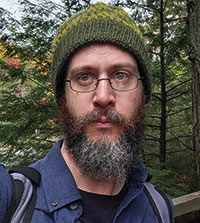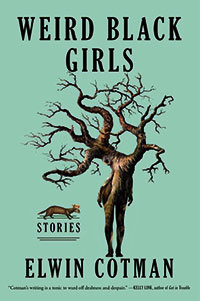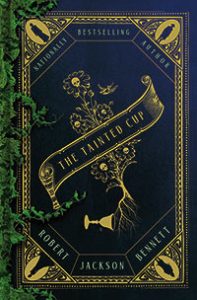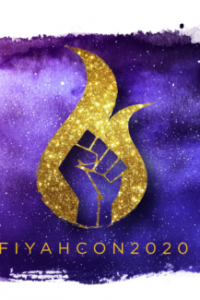The Year in Review 2024 by Jake Casella Brookins

Once again, whatever else it was, it was a good year for books. Between new releases, revisiting older selections with a book club or two, and a very rewarding set of reads for several projects I’ve been hammering at – the Ancillary Review’s podcast, particularly – I was practically drowning in fascinating titles. For my year-end list, I decided to narrow it down (painfully, regretfully) to my top three choices in three categories: science fiction, fantasy, and Weird or otherwise hard to classify.
2024 was yet another year wherein I loudly lamented the death of science fiction. Looking over my reading list for the year, I am, of course, duly embarrassed to note an absolute wealth of excellent science fiction titles once again – it’s becoming something of a tradition. What unites my top three picks in science fiction this year is anger. They’re very different books, but what Premee Mohamed’s The Siege of Burning Grass, Seth Dickinson’s Exordia, and Sofia Samatar’s The Practice, the Horizon, and the Chain have in a common is a sense of righteous rage at injustice; though none of them reach utopia, they’re all working on a map towards a better world.
 I’m counting The Siege of Burning Grass as science fiction, though one could perhaps argue that. I wouldn’t want to set its weirdness aside – delightful, inventive, and reminiscent of both the New Weird and planetary romances – but what one finds underneath that is a thoroughly unmagical interest in peace, in what people will sacrifice and compromise for their ideals and their communities, and a decidedly nonfantastic clarity about how easily toxic systems of violence can take root in a person. Alefret is the most memorable protagonist I’ve encountered in ages, and Mohamed’s delivery of deeply felt political ideals in such a simultaneously fantastic and realistic world is quite the accomplishment.
I’m counting The Siege of Burning Grass as science fiction, though one could perhaps argue that. I wouldn’t want to set its weirdness aside – delightful, inventive, and reminiscent of both the New Weird and planetary romances – but what one finds underneath that is a thoroughly unmagical interest in peace, in what people will sacrifice and compromise for their ideals and their communities, and a decidedly nonfantastic clarity about how easily toxic systems of violence can take root in a person. Alefret is the most memorable protagonist I’ve encountered in ages, and Mohamed’s delivery of deeply felt political ideals in such a simultaneously fantastic and realistic world is quite the accomplishment.
Exordia, despite its aliens and exotic physics, is more explicitly tied to our actual Earth than most SF I read this year, and its anger is much more explicit, as well. There is a lot going on in this novel, and none of it feels extraneous – first contact with aggressive and fascinating aliens, a bizarre deadly artifact like something out of Solaris or Roadside Picnic – it’s a fast-talking technophilic philosophy-thriller in the lineage of Sphere and Blood Music. But what it’s most interested in are the current, existing, real-world politics and ideologies that manufacture and excuse atrocity: imperialism, in a word, and Dickinson’s not shy about showing how we’re actively colluding. Whip-smart, sexy, and just overflowing with cool lines and ideas, Exordia blew me away, and I’m really curious to see how far Dickinson goes towards charting some solutions in the sequel.
The one book you absolutely cannot skip from 2024 is Sofia Samatar’s The Practice, the Horizon, and the Chain. (Although if you’re a writer, also don’t miss out on her book of craft and memoir, Opacities.) A generation-ship story – I know, I thought they were out of juice, too, turns out they’re not – that sometimes struck me with its realism, sometimes with its poetry, sometimes with its parable-like moral clarity, the novella distills much that I admire about Samatar’s writing: her gift for atmosphere, and for evoking a character or a culture through small gestures and details. Its engagement with class struggle broadly would recommend it in any year; this year, with universities brutally punishing students and professors for protesting the genocide in Gaza, the novella’s spear-sharp jabs at academic hypocrisy strike particularly hard. Again, it doesn’t make it all the way to a solution, but The Practice, the Horizon, and the Chain is clear that if we’re to get there, we’ll get there through solidarity, by forging chains as well as breaking them. The best thing I read this year, no question.
Although I read plenty of serious fantasy this year – and there’s plenty that’s serious in my top three – what struck me about the best fantasy that I read this year was that they reminded me that reading this stuff is fun, that my instincts and joys in reading go back to the whimsical, world-focused stories that got me into books in the first place. That sense for the fantastic place, the fantastic city in particular, is front and center in Nghi Vo’s The City in Glass. Like the science fiction above, this is a novella with anger in its marrow – a formative atrocity that never leaves the narrative or the narrator – but it’s also a love letter, a local’s gift to the inquisitive tourist, a phenomenal study in the urban imaginary. Nor is it overly precious – Vo, whose writing shines here as usual, layers this paean to cities with a healthy dose of skepticism. They’re just places, confluences of people and forces. They change; people leave. But, in this story of angels and demons and flitting generations of city-dwellers, she also captures how romantic they are, how big their histories are. The City in Glass evokes that city-feeling that can sweep over you on a good day, in cities real and unreal both.
 Death and danger lurk on every page of Robert Jackson Bennett’s The Tainted Cup, but once again I was just bowled over by what an entertaining writer he is. A pitch-perfect blend of murder-mystery and carefully constructed secondary world, my jaw is on the floor for how seamlessly he keeps this narrative humming along as he introduces ever-more outlandish and inventive elements. There are giant leviathans trying to squash all humanity, an elaborate system of quasi magical biological modifications – one could make a strong case this is science fiction, but I’m going to ignore that hypothetical case for my current categorization – and an intricate and conspiracy-rich cast of characters and cultures. Through all of it, the core mechanic – an eccentric and brilliant detective, a capable but unusual assistant with secrets of his own – just works. Surprising but rational, rich in detail, and more on the way – this is immense fun, and well worth your time.
Death and danger lurk on every page of Robert Jackson Bennett’s The Tainted Cup, but once again I was just bowled over by what an entertaining writer he is. A pitch-perfect blend of murder-mystery and carefully constructed secondary world, my jaw is on the floor for how seamlessly he keeps this narrative humming along as he introduces ever-more outlandish and inventive elements. There are giant leviathans trying to squash all humanity, an elaborate system of quasi magical biological modifications – one could make a strong case this is science fiction, but I’m going to ignore that hypothetical case for my current categorization – and an intricate and conspiracy-rich cast of characters and cultures. Through all of it, the core mechanic – an eccentric and brilliant detective, a capable but unusual assistant with secrets of his own – just works. Surprising but rational, rich in detail, and more on the way – this is immense fun, and well worth your time.
For sheer imaginative fun, nothing I read in 2024 tops Jared Pechaček’s debut novel, The West Passage. One could try to sketch out comparatives and influences – Gormenghast and Hieronymous Bosch, Steven Universe and Lewis Carroll – and, I suppose, I just have; but that doesn’t quite capture the potent inventive whimsy of this novel. It takes itself seriously, but not too seriously, and it’s simply wealthy with weird little folks trying to make their way in a big, weird, scary world. Architectural fantasy at its finest, with enchanting illustrations throughout, meditations on the monstrousness of power, and formal and narrative twists and turns. Incredibly rewarding, and feels like a new classic in the making.
I saved myself this third category for things that don’t quite fit into standard science fiction or fantasy molds, and now, of course, looking at my top three, I’m having a hard time finding a unifying theme. But I think I could say that what most impressed me in Weird fiction this year, in hard-to-classify things – and I’m absolutely grimacing about what I clipped to get this down to three – is something about knowledge: work that speaks to the difficulty of knowing what’s going on in the world, or within us; work about the attempt to know, and to act rightly even when we don’t for sure. Additionally, all three of these works – and many, I say, sighing heavily, that didn’t make my self-imposed limit – also showcase how experimentation in the form is necessary to meet the moment: how using every tool in speculative fiction’s toolbox, and making more when needed, is just barely enough to come close to something like reality.
Laura van den Berg’s State of Paradise is an excellent case in point, and an absolute stunner of a book. The novel’s nameless protagonist is herself a writer, a ghostwriter anyway; throughout State of Paradise’s increasingly surreal and fantastic Floridian exploits, the ludicrousness of writing itself is constantly in the narrator’s mind. And thus the reader’s: the anguish of the empty page, but also the silliness of conventional plots. The weirdest page-turner I’ve ever read, this novel is a catalog of strangeness that, in our actual, let’s be honest, mid-apocalyptic moment, sometimes seems winningly mundane. This is the most engaging exploration of collapse I’ve read, how ecology and culture falling apart – faster in some places – is just impossible to fit into a normal, rational novel, of any genre.
 One of the things that most stood out to me in Elwin Cotman’s Weird Black Girls is not just how speculative elements can reinforce more traditional storytelling techniques, but how there’s so much richness and strangeness in what we already know, about the world and other people, that good character work is itself a kind of speculative fiction. The stories in Cotman’s collection are superb, full of riveting images and really compelling characters and relationships. They’re a reminder that, for the best writing, genre is truly secondary: It’s a label we try to get on after the fact. Cotman uses what we could call science fiction, magical realism, and cosmic horror, but he knows that the magic is in people, in the world, in what we do and don’t know, and even his more thoroughly realistic entries are absolutely fantastic.
One of the things that most stood out to me in Elwin Cotman’s Weird Black Girls is not just how speculative elements can reinforce more traditional storytelling techniques, but how there’s so much richness and strangeness in what we already know, about the world and other people, that good character work is itself a kind of speculative fiction. The stories in Cotman’s collection are superb, full of riveting images and really compelling characters and relationships. They’re a reminder that, for the best writing, genre is truly secondary: It’s a label we try to get on after the fact. Cotman uses what we could call science fiction, magical realism, and cosmic horror, but he knows that the magic is in people, in the world, in what we do and don’t know, and even his more thoroughly realistic entries are absolutely fantastic.
One of the hardest-to-summarize novels I read this year is also one that I find myself returning to: Scott Guild’s Plastic. Peopled by living plastic figurines, with a flexible and transmedial understanding of reality, there’s more than a whiff of cyberpunk’s madcap energy here. Plastic is intensely if ambiguously melancholic, strung out on real-world crises and spinning them into strange elaborate dreams, and Guild’s experimentation with framing and language match up perfectly with – whatever the whole thing is doing. Beyond its immediate appeal, Plastic had me thinking about those books that just aren’t like any others. Not that they spring from nothing, but the ones that stand alone; the ones that are hard to place in a tradition. It’s the kind of book that you hope ambushes you when browsing a used bookstore, the kind of book that you carry in your mind your whole life. A key to a secret club, and it’s hard to find other members. With Plastic, and with all the books on my list this year, I hope to meet some of you there.
Jake Casella Brookins is a critic, independent scholar, and avid book-clubber. He’s presented his academic work on science fiction with the SFRA, ACLA, ICFA, and many more, publishes regular reviews with the Chicago Review of Books, and is the publishing editor for the Ancillary Review of Books. Originally from the Pennsylvania Appalachians, he now lives in beautiful Buffalo, New York, with his wife, the playwright Alison Casella Brookins.
This review and more like it in the February 2025 issue of Locus.
 While you are here, please take a moment to support Locus with a one-time or recurring donation. We rely on reader donations to keep the magazine and site going, and would like to keep the site paywall free, but WE NEED YOUR FINANCIAL SUPPORT to continue quality coverage of the science fiction and fantasy field.
While you are here, please take a moment to support Locus with a one-time or recurring donation. We rely on reader donations to keep the magazine and site going, and would like to keep the site paywall free, but WE NEED YOUR FINANCIAL SUPPORT to continue quality coverage of the science fiction and fantasy field.
©Locus Magazine. Copyrighted material may not be republished without permission of LSFF.







